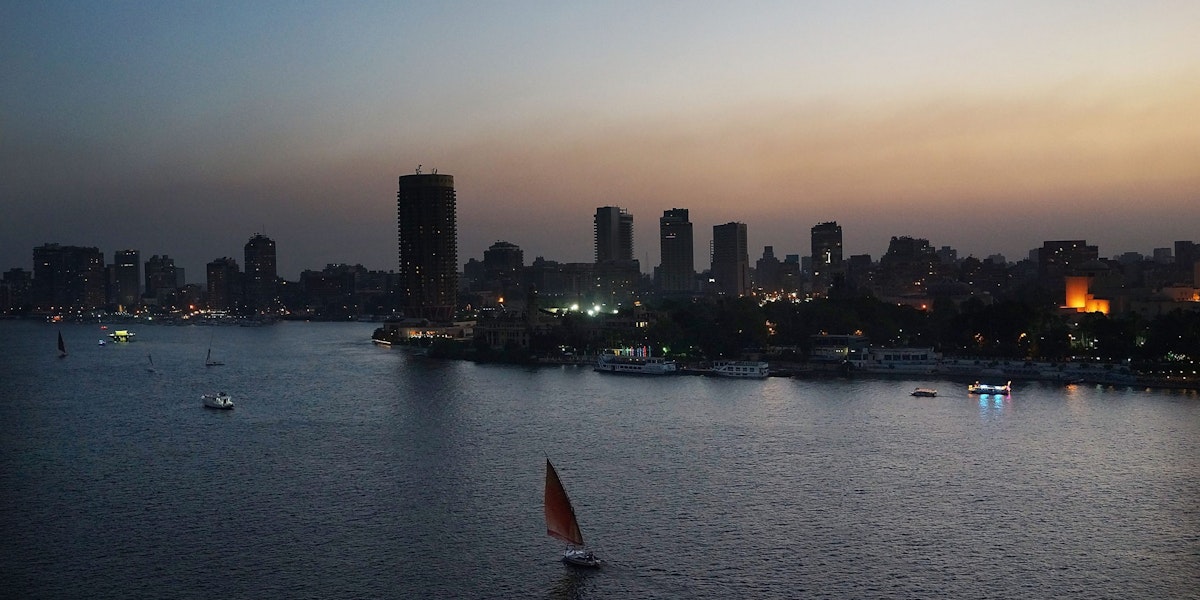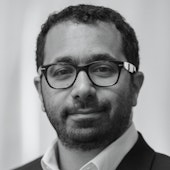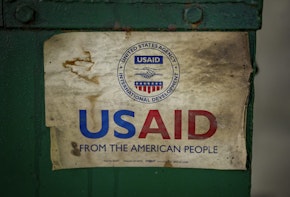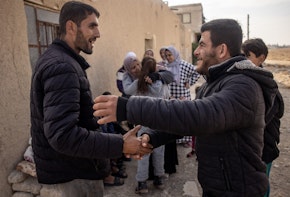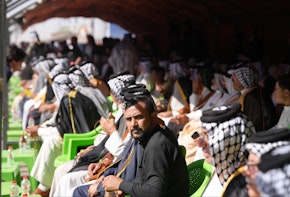The world’s longest river is not a happy place. For almost a decade, Egypt and Ethiopia have been locked in a war of words over the Grand Ethiopian Renaissance Dam (GERD), which Addis Ababa is building on the Blue Nile near the Sudanese border. Downstream, Egypt insists this dam risks shrinking what is effectively its only source of fresh water. Upstream, Ethiopia says the dam is a vital cog in its drive for development. Through years of slow-moving negotiations that have at times grown alarmingly belligerent, the Nile Basin states have shown just how testy future transboundary clashes are liable to become.
Much of this dispute has hinged on fears of imminent thirst. Since time immemorial, Egypt has relied on the river for almost all the water its citizens drink and the crops they grow. It fears a change to the status quo that Ethiopia, which supplies most of the Nile’s waters and has vast unmet electricity needs, sees as desperately unfair. Yet these tensions have laid bare much wider concerns over intensifying water scarcity, both within the Nile Basin and further afield. Populations are booming, just as climate change threatens supply. Amid periodic threats of war and growing fears of future water shortages, this clash has tested the basin’s key actors to their limits—as well as Sudan and the eight other riparian states.
Now close to completion, the GERD has so far given the lie to the often-overheated rhetoric over ‘“water wars” that has dominated much of the discourse in recent years. Egyptian and Ethiopian negotiators have successfully hashed out most details—in spite of a late, contentious intervention from the administration of Donald Trump on Egypt’s behalf. But while the prospect of conflict appears to have been overstated, for the time being at least, worsening climate stresses, erratic governance, and the complications that come with providing for the booming basin-wide population threaten to keep water experts on their toes for years to come. The dam might be the first of the Nile’s great challenges. It almost certainly won’t be the last.
The panelists are writing in a private capacity, and their views do not necessarily reflect the official position of any organizations or entities that they are affiliated with—nor those of any government.
The GERD: An Ethiopian Dream
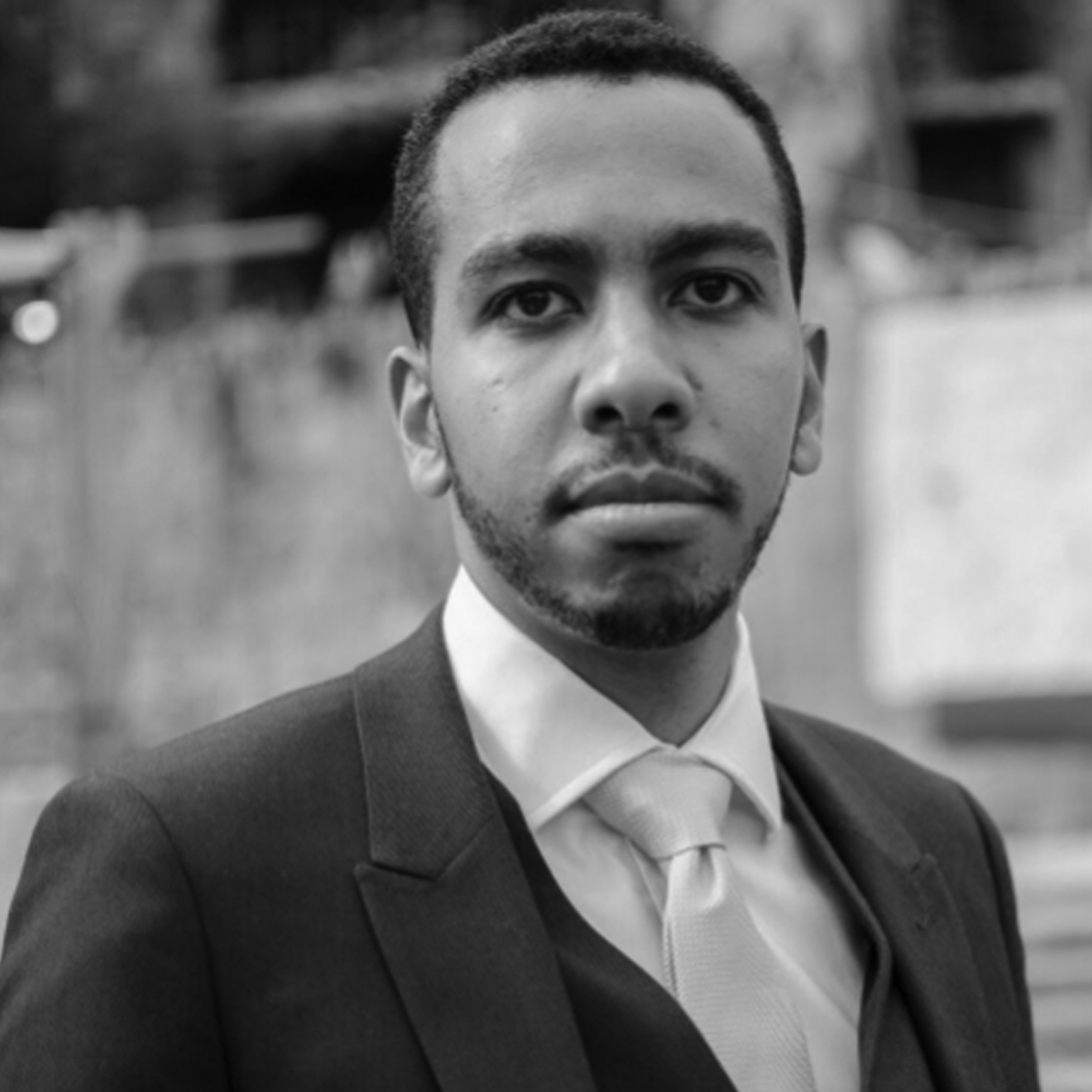 Frezer G. Haile: For successive Ethiopian governments, the rationale behind the GERD, and any hydropower project in the country, boils down to the aspiration to lift millions of Ethiopians out of abject poverty by utilizing a key resource which, hitherto, had been out of reach. Ethiopia, the second most populous country in Africa, with a population of around 110 million, currently generates less electricity nationally—4,425 megawatts (MW) of installed capacity—than North Carolina does from solar power alone (6,400 MW of installed solar capacity). Today, almost 65 million Ethiopians have no access to electricity, while the nation’s energy demands, driven by a burgeoning manufacturing sector, are growing by 19 percent every year. Combine this with a young, educated, and increasingly demanding population with expectations of decent jobs and livelihoods, and this equation fails to add up without more power. When completed, the GERD will more than double generation capacity, going a long way toward bridging the massive energy deficit within the country.
Frezer G. Haile: For successive Ethiopian governments, the rationale behind the GERD, and any hydropower project in the country, boils down to the aspiration to lift millions of Ethiopians out of abject poverty by utilizing a key resource which, hitherto, had been out of reach. Ethiopia, the second most populous country in Africa, with a population of around 110 million, currently generates less electricity nationally—4,425 megawatts (MW) of installed capacity—than North Carolina does from solar power alone (6,400 MW of installed solar capacity). Today, almost 65 million Ethiopians have no access to electricity, while the nation’s energy demands, driven by a burgeoning manufacturing sector, are growing by 19 percent every year. Combine this with a young, educated, and increasingly demanding population with expectations of decent jobs and livelihoods, and this equation fails to add up without more power. When completed, the GERD will more than double generation capacity, going a long way toward bridging the massive energy deficit within the country.
Although this also partly explains why the GERD has attracted such pride across Ethiopian society, the key to understanding the power of the GERD lies in its intentional framing as the physical embodiment of a rising Ethiopia and the catalyst of its renaissance. Moreover, the GERD has been portrayed as the spirit of a new Ethiopia. There has also been a prevalent narrative about a young Ethiopia desperate to live up to its ancient history, but with a deep desire to make history again. The GERD’s massive engineering, financing, and diplomatic challenges have been represented by the state as an opportunity to inspire this generation of Ethiopians to leave their mark and have their names engraved into the annals of history. To a large extent, this discursive framing has been very effective in galvanizing public support for the project throughout most of its construction.
Egyptian Fears
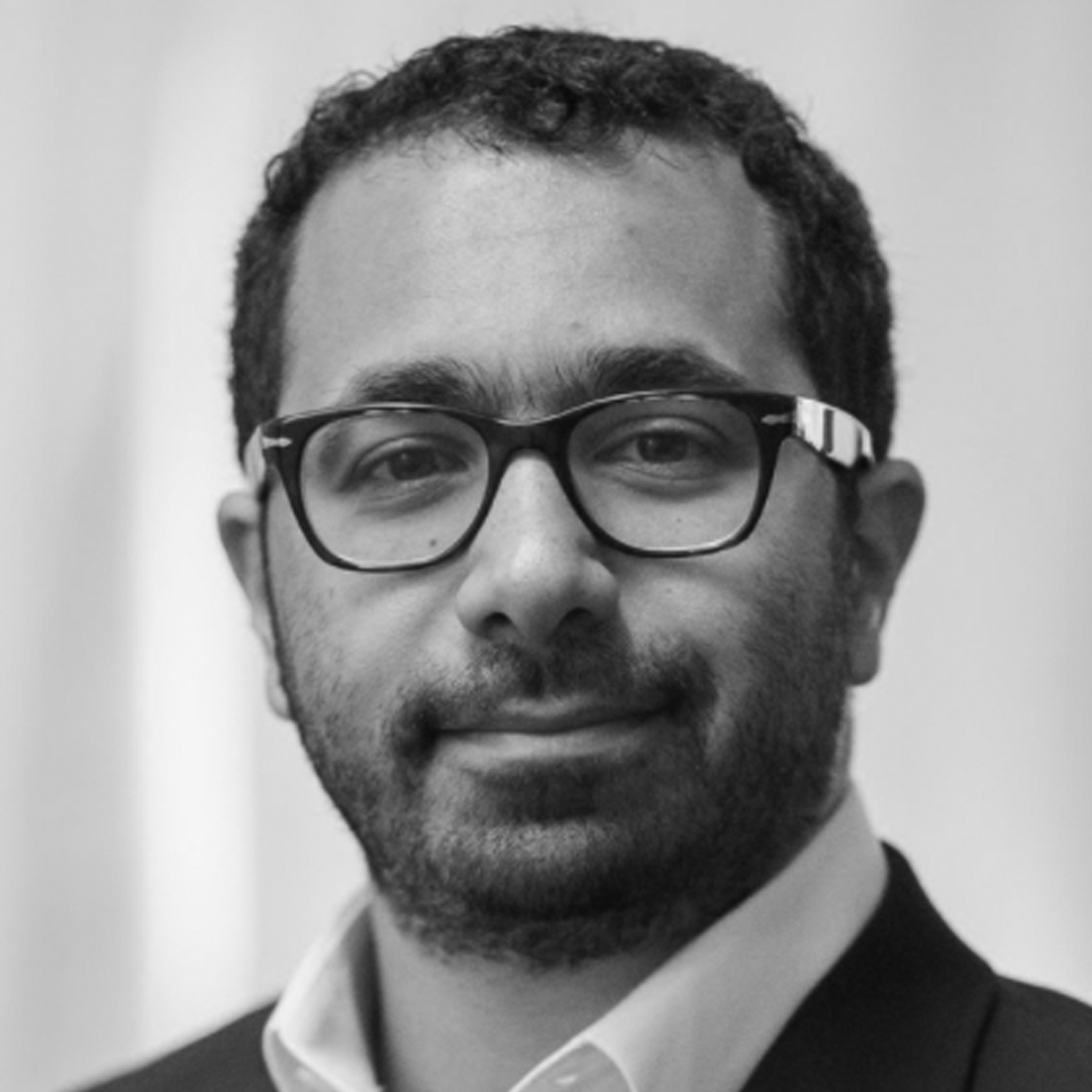 Timothy Kaldas: Initially, Egypt wanted to veto the GERD, since it has long opposed upstream projects of this nature—out of fears both that they could disrupt flows of the Nile downstream, and that upstream states would have enormous leverage over Egypt in the future. Egypt has consistently cited the 1959 Nile Water Agreement, which gives Cairo, along with Sudan, the right to veto upstream projects. Naturally, upstream states have long rejected the legitimacy of this agreement and insist that it is a colonial artifact that can no longer govern the Nile Basin.
Timothy Kaldas: Initially, Egypt wanted to veto the GERD, since it has long opposed upstream projects of this nature—out of fears both that they could disrupt flows of the Nile downstream, and that upstream states would have enormous leverage over Egypt in the future. Egypt has consistently cited the 1959 Nile Water Agreement, which gives Cairo, along with Sudan, the right to veto upstream projects. Naturally, upstream states have long rejected the legitimacy of this agreement and insist that it is a colonial artifact that can no longer govern the Nile Basin.
Egypt has, however, come to accept that the GERD will be built and operated and has focused instead on establishing a binding framework for the management of the dam between itself, Ethiopia, and Sudan. Much progress has been made in talks about fill times: essentially, a reservoir that is filled faster will have bigger downstream impacts. But there remains tension over the management of the dam in the long term, particularly in the event of long-term droughts. There are fears that during long droughts, Ethiopia may hold back water to maintain reservoir levels at a certain minimum, which will reduce the amount of water reaching Sudan and Egypt. And Ethiopia has objected to guaranteeing any set amount of water to downstream countries. Egypt’s challenge is that without the Nile Water Agreement, Cairo has little if any leverage over Ethiopia. So, talks have stalled, as Ethiopia is averse to signing a binding agreement—or even acknowledging any potential for negative downstream effects in the future.
Should there be a reduction in flow over any extended period of time, Egypt has legitimate reason to worry. A reduction in flow will likely cause the desertification of increasingly scarce fertile land along the Nile and an acceleration of the salinization of the Nile Delta. Alternative sources of fresh water such as desalination or aquifers (many of which are nonrenewable) cannot address the serious impact of reduced flow on the amount of arable land available in Egypt.
The Supporting Cast
 Peter Schwartzstein: Though the Nile dispute has often been presented as a largely Egyptian and Ethiopian affair—and to a considerable extent it is—Sudan and the other riparian states have figured prominently throughout. Ethiopia scored a major early diplomatic coup when, in 2013, then Sudanese dictator Omar al-Bashir threw his weight behind the GERD, breaking what had previously been a consistent Lower Nile opposition to upriver schemes. (By the terms of the 1959 treaty, Sudan is entitled to a quarter of the Nile’s waters, but some officials in Khartoum felt that they stood to gain more from the GERD’s electricity generation and flood-stopping potential than they risked losing to temporarily reduced river flow or damage to their own dams.) And while Sudan has since moderated its approach under Bashir’s more Egypt-friendly successor—a joint civilian–military administration—that fierce tussle for influence among the two main antagonists continues elsewhere in the basin.
Peter Schwartzstein: Though the Nile dispute has often been presented as a largely Egyptian and Ethiopian affair—and to a considerable extent it is—Sudan and the other riparian states have figured prominently throughout. Ethiopia scored a major early diplomatic coup when, in 2013, then Sudanese dictator Omar al-Bashir threw his weight behind the GERD, breaking what had previously been a consistent Lower Nile opposition to upriver schemes. (By the terms of the 1959 treaty, Sudan is entitled to a quarter of the Nile’s waters, but some officials in Khartoum felt that they stood to gain more from the GERD’s electricity generation and flood-stopping potential than they risked losing to temporarily reduced river flow or damage to their own dams.) And while Sudan has since moderated its approach under Bashir’s more Egypt-friendly successor—a joint civilian–military administration—that fierce tussle for influence among the two main antagonists continues elsewhere in the basin.
Egypt started with a considerable disadvantage in trying to shore up support for its position. After years of neglecting its ties with sub-Saharan Africa during the presidency of Hosni Mubarak (1981–2011), Cairo has had to devote considerable diplomatic energy to try and make up lost ground. Egyptian leaders have enjoyed some success, wooing states from Burundi to South Sudan with trade deals—and frequent high-level visits. But Ethiopia, which hosts the headquarters of the African Union and has extensive ties with many of its Upper Nile neighbors, has a strong hand of its own. Many of these riparian states are similarly dismissive of Egypt’s “historic rights” and also harbor long-standing ambitions to harness the Nile.
Escalating Tensions
 Frezer: Firstly, I think it is important to make crystal clear that the 1959 agreement between Egypt and Sudan in no way grants either country veto rights over projects elsewhere in the Basin. This is a common misperception. Instead, what the treaty does do is present the Nile as the exclusive affair of two countries, barely acknowledging the fact that the river and its tributaries emanate from and flow through at least eight other countries before the water reaches Sudan. This perceived right to the Nile has engendered a sense of downstream entitlement that has had consequences on intra-basin relations since.
Frezer: Firstly, I think it is important to make crystal clear that the 1959 agreement between Egypt and Sudan in no way grants either country veto rights over projects elsewhere in the Basin. This is a common misperception. Instead, what the treaty does do is present the Nile as the exclusive affair of two countries, barely acknowledging the fact that the river and its tributaries emanate from and flow through at least eight other countries before the water reaches Sudan. This perceived right to the Nile has engendered a sense of downstream entitlement that has had consequences on intra-basin relations since.
The legacy of the 1959 agreement is clearly borne out in the tense relations between Ethiopia and Egypt in their interactions over the GERD. In many ways, you could describe the quarrel as being the result of equal measures of naivety and entitlement. Ethiopia naively assumed that technical consultations and trust-building, via a tripartite platform, would be effective in moderating the Egyptian desperation to maintain the status quo. Egypt, on the other hand, with its own misplaced assumptions about Ethiopia’s ability to unilaterally construct a large-scale dam on the Nile, reacted with shock and fury at this brazen attempt to upend this status quo. This, coupled with an intense nationalistic fervor surrounding both countries’ rights to the Nile, put them poles apart—ultimately representing a gulf that would only be bridged with significant concessions from the Egyptian side. I don’t believe that Ethiopia could have managed the fallout better, since Egypt had zero appetite for upstream development on the Nile. Thus, just as in the five stages of grief, the Egyptian position had to cycle through the prerequisite denial, anger, bargaining, and depression to arrive at a place of acceptance. Only with the acceptance of the reality of the GERD could genuine negotiations between the parties take place.
 Timothy: Egypt has good reason to be concerned about how Ethiopia has pursued this project. Ethiopia began constructing this dam without conducting the independent environmental and social impact assessment (ESIA) normally required to proceed with such works. In an effort to get around Egyptian obstructionism in the past, Ethiopia self-financed the construction of the dam—which allowed it to avoid an ESIA, or consultations with downstream countries ahead of the launch of the project. Egypt has historically refused to entertain any such building on the Nile in upstream countries. Egypt’s former president, Anwar Sadat, even threatened military action to prevent a previous plan to build a dam in Ethiopia on the Blue Nile. The challenge now is that Egypt, under its current president, Abdel Fattah el-Sisi, has accepted the dam as a fact of life, and is trying to negotiate a binding agreement over how the dam will be managed in the future. While Ethiopia continues to participate in the talks, a number of issues have prevented reaching such an agreement. Initially, political turmoil in Ethiopia derailed talks. Since then, Egyptians, Ethiopians, and Sudanese officials have conducted lengthy negotiations but failed to reach a consensus on how the dam will be managed—with Ethiopia rejecting any binding agreement at all. Ethiopia would rather agree on principles and retain full autonomy of managing the dam in the future. However, given that most of Egypt’s fresh water comes from the Blue Nile, Cairo finds this an unsettling prospect. Needless to say, there is also a dearth of trust.
Timothy: Egypt has good reason to be concerned about how Ethiopia has pursued this project. Ethiopia began constructing this dam without conducting the independent environmental and social impact assessment (ESIA) normally required to proceed with such works. In an effort to get around Egyptian obstructionism in the past, Ethiopia self-financed the construction of the dam—which allowed it to avoid an ESIA, or consultations with downstream countries ahead of the launch of the project. Egypt has historically refused to entertain any such building on the Nile in upstream countries. Egypt’s former president, Anwar Sadat, even threatened military action to prevent a previous plan to build a dam in Ethiopia on the Blue Nile. The challenge now is that Egypt, under its current president, Abdel Fattah el-Sisi, has accepted the dam as a fact of life, and is trying to negotiate a binding agreement over how the dam will be managed in the future. While Ethiopia continues to participate in the talks, a number of issues have prevented reaching such an agreement. Initially, political turmoil in Ethiopia derailed talks. Since then, Egyptians, Ethiopians, and Sudanese officials have conducted lengthy negotiations but failed to reach a consensus on how the dam will be managed—with Ethiopia rejecting any binding agreement at all. Ethiopia would rather agree on principles and retain full autonomy of managing the dam in the future. However, given that most of Egypt’s fresh water comes from the Blue Nile, Cairo finds this an unsettling prospect. Needless to say, there is also a dearth of trust.
The lack of trust around the negotiating table is grounded in both Egypt’s historic efforts to unilaterally veto Nile Basin development projects and Ethiopia’s imposition of the GERD fait accompli. At the moment, Egypt appears to have accepted reality, and is negotiating in good faith. But Cairo worries that Ethiopia has no interest in a binding agreement and is playing for time with talks. Meanwhile, Egypt worries, Ethiopia is filling the reservoir and seeking to impose the dam without a multilateral agreement on its management in the future. Such Ethiopian actions bode ill for downstream nations, not only because of the GERD but because they set a dangerous precedent for other riparian states pursuing projects unilaterally.
An effective consensual, multilateral process is needed to peacefully and safely manage this vital resource in the coming decades. Pressures are likely only to increase. Egypt appears to be coming to accept that the 1959 agreement is no longer effective at protecting its interests. This acceptance offers an opportunity for a new agreement that can more thoroughly protect downstream countries’ vital interests—while recognizing those of upstream states as well.
Wider Environmental Context
 Peter: With all of the focus on the GERD, one might be forgiven for thinking that the dam and the dam alone is the Nile’s great water issue. In reality, though, it’s one of many. Water pollution is worsening up and down the river to such a point that, in some places, fish struggle to survive. Saltwater intrusion into northern Egyptian aquifers is accelerating as the Mediterranean rises and the Nile Delta subsides due to insufficient reinforcing silt. Egypt’s own dams have cut the volume of sediment flowing downstream over the past century. More importantly, increasingly erratic rainfall in the Ethiopian highlands, which generate well over 80 percent of the Nile’s volume, threatens to upturn the river altogether. Though climate projections vary, with some even pointing to elevated precipitation, any change in the river’s flow is likely to have dramatic ramifications.
Peter: With all of the focus on the GERD, one might be forgiven for thinking that the dam and the dam alone is the Nile’s great water issue. In reality, though, it’s one of many. Water pollution is worsening up and down the river to such a point that, in some places, fish struggle to survive. Saltwater intrusion into northern Egyptian aquifers is accelerating as the Mediterranean rises and the Nile Delta subsides due to insufficient reinforcing silt. Egypt’s own dams have cut the volume of sediment flowing downstream over the past century. More importantly, increasingly erratic rainfall in the Ethiopian highlands, which generate well over 80 percent of the Nile’s volume, threatens to upturn the river altogether. Though climate projections vary, with some even pointing to elevated precipitation, any change in the river’s flow is likely to have dramatic ramifications.
And while these long-term concerns might make the GERD seem like small fry by comparison, they also help explain why the dam has become an even bigger bone of contention than its impact arguably warrants. Fearful for their water and agricultural futures, many of the basin’s leading states are scrambling to position themselves for a more resource-scarce world. In some ways, the dam is merely an easily comprehensible and highly tangible totem for these looming crises.
Next Steps
 Frezer: Though I wish I could be more optimistic on the prospects of a truly win-win solution over the GERD, I fear that it would be naive. Filling of the GERD reservoir has already started. Negotiations have dragged on for almost a decade now, involved multiple observers and venues, and much shuttle diplomacy. Yet we seem no closer to any side being satisfied with this process’s outcomes. In many ways, the Brexit mantra of “no deal is better than a bad deal” might be better suited to characterizing the Ethiopian position at this late stage in the negotiations. Egypt’s failure to recognize this earlier—and to compromise accordingly—has kneecapped any leverage it still had in these talks. This lack of compromise also continues to be the greatest impediment to the current tripartite negotiations. Egypt’s blinkered insistence on recognition of notions of “historic rights and current utilization” in any possible agreement on the GERD only aggravates Ethiopian negotiators, who see this as an unfathomable proposition.
Frezer: Though I wish I could be more optimistic on the prospects of a truly win-win solution over the GERD, I fear that it would be naive. Filling of the GERD reservoir has already started. Negotiations have dragged on for almost a decade now, involved multiple observers and venues, and much shuttle diplomacy. Yet we seem no closer to any side being satisfied with this process’s outcomes. In many ways, the Brexit mantra of “no deal is better than a bad deal” might be better suited to characterizing the Ethiopian position at this late stage in the negotiations. Egypt’s failure to recognize this earlier—and to compromise accordingly—has kneecapped any leverage it still had in these talks. This lack of compromise also continues to be the greatest impediment to the current tripartite negotiations. Egypt’s blinkered insistence on recognition of notions of “historic rights and current utilization” in any possible agreement on the GERD only aggravates Ethiopian negotiators, who see this as an unfathomable proposition.
The GERD has proven itself a remarkably resilient project against the backdrop of political flux in Ethiopia and simmering tensions with Egypt over the years. Its unassailable position in the national conversation as a source of unity and national pride has allowed it to escape, largely unscathed, from everything including threats of attack from Egypt to the tinderbox-like dynamics of the domestic political battles leading up to the historic 2018 transition. The early months following this transition were uncertain, even for the GERD, with allegations of corruption and investigations into the untimely death of its lead engineer, Simegnew Bekele, clouding the project’s prospects. Yet the project regrouped, proving its impregnability once again. In the current armed showdown between the federal government and the Tigray People’s Liberation Front, I see few plausible scenarios in which this project will be affected in any significant way.
 Timothy: Throughout Sisi’s tenure as president it’s been fairly clear that Egypt accepted the unavoidable reality that the GERD would be completed. Ethiopia was successful at unilaterally imposing facts on the ground that Egypt came to recognize it could not reverse. Egypt’s recognition is a significant departure from its historic tendency to reject and veto upstream Nile projects. At this point, progress has been made on the fill schedule, despite the absence of a final and comprehensive agreement. The more pressing concern in Cairo is over the long-term management of the dam, particularly during periods of extended droughts.
Timothy: Throughout Sisi’s tenure as president it’s been fairly clear that Egypt accepted the unavoidable reality that the GERD would be completed. Ethiopia was successful at unilaterally imposing facts on the ground that Egypt came to recognize it could not reverse. Egypt’s recognition is a significant departure from its historic tendency to reject and veto upstream Nile projects. At this point, progress has been made on the fill schedule, despite the absence of a final and comprehensive agreement. The more pressing concern in Cairo is over the long-term management of the dam, particularly during periods of extended droughts.
The lack of leverage on the part of Egypt over officials in Ethiopia—coupled with Trump essentially confirming Ethiopian suspicions that Washington is a biased mediator—adds to the challenge for Egypt to find a pathway to advance talks and secure a compromise that includes concessions from the Ethiopian side. I suspect that after nearly a decade since this project’s start, we’re likely to witness an ongoing stalemate. Egypt’s hope for a comprehensive and binding agreement remains elusive.
The dam’s impact on water in Egypt won’t likely affect everyday consumption so much as it will affect the country’s agricultural land. Desalination can’t address this. It would be prudent for the Egyptian government to return to reevaluating the crops being cultivated, and discourage water-intensive crops as much as possible. Egypt will also have to prepare to expand the scale of agricultural goods it imports, placing an additional burden on its persistent current account deficit.
Egypt should continue to look for ways to increase the efficiency of water usage while building up its desalination capacity, but none of this will completely remedy the likely impact of any disruption of flow that the dam causes.
Ethiopia insists there will be no negative impact downstream—as the main purpose of this dam is for water to flow through in order to produce electricity. But the fact remains that, elsewhere in the world, large dams like the GERD have affected the quantity and quality of water traveling downstream. In the long term, Egypt and Sudan will have to work toward a regional arrangement to avoid further risks to their access to Nile water.
An Uncertain Future
 Frezer: Above all else, the key takeaway for Addis Ababa from the GERD engagements over the years must be the need to win the narrative war often and early. Throughout this episode, Egypt has discursively outmaneuvered Ethiopia in the international media, and outworked it on the diplomatic stage. This must change going forward, with a more ambitious communications agenda and a more proactive diplomatic strategy.
Frezer: Above all else, the key takeaway for Addis Ababa from the GERD engagements over the years must be the need to win the narrative war often and early. Throughout this episode, Egypt has discursively outmaneuvered Ethiopia in the international media, and outworked it on the diplomatic stage. This must change going forward, with a more ambitious communications agenda and a more proactive diplomatic strategy.
For Egypt, there must be a readiness to finally compromise on historic rights, lest Cairo simply be ignored and disregarded within an evolving basin. It is inarguable that the next three decades on the Nile will be characterized by the expansions of hydraulic and agricultural missions in Ethiopia, Sudan, and Uganda. Thus, the current debates surrounding the GERD, a nonconsumptive hydropower project, will take on an even sharper focus going forward. Nonengagement with the basin cannot remain a viable option for Egypt. It must thaw out its frozen membership at the Nile Basin Initiative (NBI) and return to the negotiating table on the Cooperative Framework Agreement (the only basin-wide legal framework on the Nile).
For Washington, the failure of its attempted mediation, earlier this year, was a significant diplomatic blow on the international stage. Though much the symptom of the Trump administration’s haphazard style, U.S. and World Bank officials failed to read the room. Ethiopia’s position on the GERD was never going to be reconciled with Egypt’s through the arm-twisting of a third party. In fact, it could be argued that this approach served to further entrench Ethiopia’s position, as shown by the consensus that has now emerged on the GERD’s four-to-seven-year reservoir filling time. The new administration in Washington could go a long way toward rebuilding its image in the basin by expressing support to the NBI process and encouraging Egyptian reengagement.
 Timothy: The most troubling lesson one can draw from this episode is that unilateralism works. Other Nile Basin countries will take note that Addis Ababa succeeded in imposing facts on the ground while, as noted above, failing to conduct the appropriate independent environmental and social impact assessments, or consulting with downstream countries before initiating the project. It is impossible not to recognize that Egypt shares responsibility for things going this way. Its past intransigence with Nile Basin countries and insistence that it could unilaterally veto their Nile development efforts encouraged Ethiopia’s leaders to pursue the unilateral strategy they undertook.
Timothy: The most troubling lesson one can draw from this episode is that unilateralism works. Other Nile Basin countries will take note that Addis Ababa succeeded in imposing facts on the ground while, as noted above, failing to conduct the appropriate independent environmental and social impact assessments, or consulting with downstream countries before initiating the project. It is impossible not to recognize that Egypt shares responsibility for things going this way. Its past intransigence with Nile Basin countries and insistence that it could unilaterally veto their Nile development efforts encouraged Ethiopia’s leaders to pursue the unilateral strategy they undertook.
Egypt has been working for the past several years to rebuild its diplomatic footprint in Africa and strengthen ties throughout the continent. To avoid a chaotic series of unilateral projects on the Nile by upstream countries, Egypt and Sudan should be proactive in engaging with their Nile Basin neighbors to develop an effective multilateral framework that balances the interests and needs of all the countries along the Nile and its tributaries. Repeated uncoordinated projects on the Nile could prove extremely damaging to not only Egypt and Sudan, but also other nations in the Nile Basin.
Friends and allies of Egypt, Ethiopia, and Sudan, as well as those with interests in the Nile Basin, should do all they can to encourage an orderly and cooperative multilateral approach that deters future unilateralism. Nations seeking to aid Egypt in this dispute should avoid the punitive approach followed by Trump, and seek to find ways to address Ethiopia’s other needs as an incentive to make concessions on Egypt’s concerns. Ethiopia will need to build an enormous amount of infrastructure to distribute the energy the dam produces both domestically and abroad. Assistance in financing and expertise in developing this infrastructure can be conditioned on a consensual and comprehensive resolution of the dam dispute. This is also an opportunity for some cooperation beyond the traditional cast of American allies: China shares an interest in strong relations with both Egypt and Ethiopia, and could potentially play a constructive role in encouraging a resolution.
This roundtable was produced with support from the Rockefeller Brothers Fund as part of the TCF initiative “Nature and National Security in the Middle East.”
